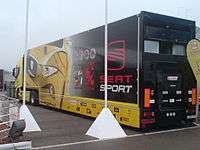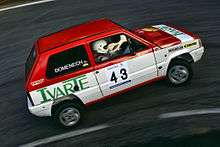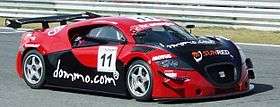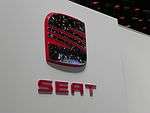SEAT Sport
 | |
| Subsidiary of SEAT S.A. | |
| Industry | Automotive |
| Predecessor | SEAT Special Vehicles department |
| Founded | 1985 |
| Headquarters | Abrera, Spain |
| Services | develop, support and compete with SEAT race cars, and produce high performance components for SEAT road car versions |
| Website | http://www.seat-sport.com/ |
SEAT Sport is the motorsport division of the Spanish automobile manufacturer SEAT, founded in 1985,[1] succeeding the "SEAT Special Vehicles department" which had been formed in 1971 with the mission to enforce the brand's participation in rally championships, followed by 11 titles between 1979 and 1983.[2] It has competed in rallying and touring car racing, and also develops high performance versions of road cars. The result of this effort has been rewarded through SEAT's most prestigious titles in FIA championships, three conquests with the SEAT Ibiza Kit-Car in the FIA 2L World Rally Championship (WRC) (1996, 1997, 1998) and two times with the SEAT León in the FIA World Touring Car Championship (WTCC) (2008, 2009).[3]
Rallying

SEAT's first serious attempt at a World Rally Championship (WRC) was back in the 1977 season when SEAT took part with its 'SEAT 1430/124D Especial 1800' race car, and already in its debut rallying event at the Monte Carlo Rally the SEAT team finished in the third and fourth place with the official 1430-1800 cars being driven by Antonio Zanini and Salvador Cañellas. In the recent years the consignment was burdened on the small SEAT Ibiza, a 1.6L normally aspirated front-wheel drive car with its roots in the Volkswagen Polo. The Ibiza allowed the company to start building its rallying experience, and was officially engaged in some European national championships. The years went by and little success followed until a 2L version of the Ibiza was homologated as a kit-car, and extra wide tracks, larger wheels, brakes, etc., were fitted to it as the Fédération Internationale de l'Automobile (FIA) kit-car regulations allow. With these attributes, the car won the 2L World Championship three times ('96, '97, '98).
SEATs three conquests of the 2L FIA title, and the sport's popularity in Spain, convinced Volkswagen Group management to go further, and allocate sufficient budgets to the SEAT Sport department so as to allow it a chance to reach its goal. SEATs project to build a WRC-spec car was officially announced during the 1997 San Remo rally. It was in 1998 that the SEAT Córdoba WRC was first enrolled by the company to compete at the highest level of WRC racing. The Córdoba was based on the family saloon of the same name but was, naturally, a WRC class car. It had a 4 cylinder turbocharged petrol engine, permanent four-wheel drive, and active differentials were involved in its transmission. However, the short wheelbase and high-mounted engine (compared to its rivals) worked against the Córdoba, and results weren't impressive. The main drivers were ex-WRC champion Didier Auriol, along with Harri Rovanpera and rising Finnish star Toni Gardemeister. They did achieve three podium finishes; at the 1999 Rally New Zealand (Gardemeister), the 1999 Rally of Great Britain (Rovanpera) as well as the 2000 Safari Rally (Auriol). SEAT pulled out of international rallying at the end of 2000.
WRC Results
| Year | Car | No | Driver | 1 | 2 | 3 | 4 | 5 | 6 | 7 | 8 | 9 | 10 | 11 | 12 | 13 | 14 | WDC | Points | WMC | Points |
|---|---|---|---|---|---|---|---|---|---|---|---|---|---|---|---|---|---|---|---|---|---|
| 1998 | Seat Cordoba WRC | 9 | |
MON | SWE | KEN | POR | ESP | FRA | ARG | GRC | NZL | FIN 11 |
ITA Ret |
AUS 11 |
GBR 6 |
15th* | 3* | 5th | 1 | |
| 10 | |
MON | SWE | KEN | POR | ESP | FRA | ARG | GRC | NZL | FIN Ret |
- | 0 | ||||||||
| |
ITA 16 |
AUS Ret |
- | 0 | |||||||||||||||||
| |
GBR Ret |
- | 0 | ||||||||||||||||||
| 1999 | Seat Cordoba WRC | 9 | |
MON 7 |
SWE 16 |
KEN 6 |
POR Ret |
ESP 14 |
FRA 13 |
ARG Ret |
GRE Ret |
NZL Ret |
9th | 10 | 5th | 23 | |||||
| Seat Cordoba WRC Evo2 | FIN 5 |
CHN 5 |
ITA 16 |
AUS 6 |
GBR 3 | ||||||||||||||||
| Seat Cordoba WRC | 10 | |
MON 6 |
SWE | KEN Ret |
POR Ret |
ESP 10 |
FRA 9 |
ARG Ret |
GRE Ret |
23rd | 1 | |||||||||
| Seat Cordoba WRC Evo2 | CHN Ret |
ITA 16 |
|||||||||||||||||||
| Seat Cordoba WRC | |
SWE Ret |
15th* | 5* | |||||||||||||||||
| |
NZL 3 |
13th* | 6* | ||||||||||||||||||
| Seat Cordoba WRC Evo2 | FIN 6 |
AUS 16 |
GBR Ret | ||||||||||||||||||
| Seat Cordoba WRC Evo2 | 16 | |
MON | SWE | KEN | POR | ESP | FRA | ARG | GRE | NZL | FIN | CHN | ITA | AUS | GBR Ret |
- | 0 | |||
| 20 | |
MON | SWE | KEN | POR | ESP | FRA | ARG | GRE | CHN | ITA Ret |
13th* | 6* | ||||||||
| 2000 | SEAT Cordoba WRC Evo2 | 7 | |
MON Ret |
SWE 10 |
KEN 3 |
POR 10 |
ESP 13 |
ARG Ret |
GRC Ret |
NZL Ret |
12th | 4 | 5th | 11 | ||||||
| SEAT Córdoba WRC Evo3 | FIN 11 |
CYP Ret |
FRA 8 |
ITA 17 |
AUS 8 |
GBR 9 | |||||||||||||||
| SEAT Cordoba WRC Evo2 | 8 | |
MON 4 |
SWE Ret |
KEN Ret |
POR 9 |
ESP Ret |
ARG Ret |
GRC Ret |
NZL Ret |
13th | 4 | |||||||||
| SEAT Cordoba WRC Evo3 | FIN Ret |
CYP Ret |
FRA 11 |
ITA Ret |
AUS 6 |
GBR 12 | |||||||||||||||
| SEAT Cordoba WRC Evo2 | 17 | |
MON | SWE 12 |
KEN | POR | ESP | ARG | GRC | NZL | 9th* | 7* | |||||||||
| SEAT Cordoba WRC Evo3 | FIN | CYP | FRA | ITA | AUS | GBR 10 | |||||||||||||||
| SEAT Cordoba WRC Evo3 | 20 | |
MON | SWE | KEN | POR | ESP | ARG | GRC | NZL | FIN | CYP | FRA | ITA | AUS | GBR Ret |
- | 0 | |||
| 2001 | SEAT Cordoba WRC Evo3 | - | |
MON | SWE | POR 16 |
ESP Ret |
ARG Ret |
CYP Ret |
GRC | KEN | FIN | NZL | ITA | FRA | AUS | GBR | – | 0 | - | 0 |
| 21 | |
MON | SWE | POR | ESP Ret |
ARG | CYP | GRC | KEN | FIN | NZL | ITA | FRA | AUS | GBR | – | 0 | ||||
| 24 | |
MON | SWE | POR | ESP | ARG | CYP | GRC | KEN | FIN | NZL | ITA | FRA | AUS | GBR Ret |
– | 0 | ||||
Touring cars
In 2002 SEAT Sport set up the SEAT León Supercopa in Spain, a one-make series featuring the SEAT León. This format has since expanded across Europe, with the formation of the SEAT León Eurocup in 2008. In 2003, SEAT began entering the SEAT Toledo Cupra in the European Touring Car Championship (ETCC) with drivers Jordi Gené and Frank Diefenbacher. Former British Touring Car Championship winner Rickard Rydell joined them in 2004, taking their first victory.
WTCC
In 2005, the ETCC became the World Touring Car Championship (WTCC). Peter Terting replaced fellow German Diefenbacher. Jason Plato also joined the team for four rounds, and Marc Carol for one round. Later in 2005, the León model made its debut.
In 2006, Gabriele Tarquini, Yvan Muller and James Thompson joined the team. André Couto, Oscar Nogués and Florian Gruber also raced in one-off rounds.
In 2007, Rydell, Thompson and Terting left the team and were replaced by Michel Jourdain, Jr. and Tiago Monteiro. Terting and Rydell later made one-off appearances for the team, as did Nogués. Towards the end of the season SEAT debuted the TDi diesel version of the León.
In 2008, Jourdain left the team, as the team scaled down from a six-car to a five-car team. Yvan Muller won SEAT's first driver's championship in the WTCC and SEAT also won the manufacturers title.
In 2009, SEAT Sport continued with the same five drivers, with French team Oreca assisting with the operation. Gabriele Tarquini won SEAT's second in-a-row driver's championship in the WTCC and SEAT won the manufacturers title for a second consecutive year.
After winning two consecutive driver's and manufacturers titles, SEAT withdrew from the WTCC at the end of the 2009 season as a manufacturer-backed team. However, in January 2010, it was announced that they would provide backing to the newly formed SR-Sport team run by SUNRED Engineering, while also confirming Gabriele Tarquini, Jordi Gene, Tiago Monteiro and Tom Coronel as 2010 drivers, as Yvan Muller departed for the works Chevrolet team.
For 2012, SEAT Announced that they will return to the WTCC Season as a Customer Supply team, SEAT Sport supplied engines in 2012 to the Lukoil Racing Team who run two 1.6T cars driven by veteran SEAT Driver Gabriele Tarquini and Aleksei Dudukalo. They also supplied 1.6T Engines to the Tuenti Racing Team who ran cars for Pepe Oriola and Fernando Monje, Tuenti Racing Team driver Tiago Monteiro ran a SEAT Sport TDI engine for the first weekend but then switched to a 1.6T engine supplied by SUNRED. Special Tuning Racing have run both a 1.6T engine and 2.0 TDI engine both supplied by SEAT Sport, Daryll O'Young has only used the 1.6T engine but Tom Boardman used the 2.0TDI from the start of the season till round 7. SUNRED engineering ran a SEAT Sport 2.0TDI engine at the start of the season in Andrea Barlesi's car but then switched to the SUNRED 1.6T engine from rounds 2-3.
BTCC
Between 2004 and 2008, SEAT Sport competed in the British Touring Car Championship, under the SEAT Sport UK banner. Jason Plato drove for the team for five years, while Rob Huff, James Pickford, Luke Hines, Darren Turner, James Thompson and WTCC regular Tom Coronel (as a one-off) also competed. Initially the cars were run by RML Group until they began concentrating on the Chevrolet WTCC project. Plato finished as championship runner-up in 2006 and 2007. In 2008 the TDi version was used, but reliability was a problem. Two teams continued to campaign petrol SEATs in the championship during 2009 with Adam Jones and series returnee Dan Eaves competitive for the Cartridge World Clyde Valley team, while Gordon Shedden drove for Clyde Valley for a couple of events before it withdrew, but he returned to drive a Leon for the Club Seat outfit.
In 2010, Tom Boardman drove a petrol SEAT Leon Under the team name Special Tuning UK with sponsorship from Club SEAT. Phil Glew joined Tom in a SEAT for one weekend at Silverstone racing under the team name of YourRacingCar.com but the car was run by Special Tuning UK.
In 2011, Tom Boardman & Dave Newsham drove Petrol SEATs under the team name Special Tuning Racing. Special Tuning Racing where not associated with SEAT Sport or SEAT Sport UK Tom came first in the third race at Knochill.[4]
Models






Some SEAT models of competition and special sporting versions are
- SEAT 1400 B (1957 - Juan Fernández - Copa Montjuïc de Cotxes Sport)
- SEAT 850 Coupé (1967 - A. Pérez Sutil, D. Morán)
- SEAT 1430-1600 (1970 - Del Vaz, Lazcano - London-Mexico)
- SEAT 124 Sport (1970)
- SEAT 124 Sport (1971 - Manuel Juncosa, M. Salas - Rally Basc-Navarrès)
- SEAT Fórmula 1430 (1971)
- SEAT 850 Spider Gr. 5 (1972 - Juncosa)
- SEAT SELEX ST3 (1972 - Salvador Cañellas - SEAT Fórmula 1430)
- SEAT 127 Gr. 2 (1973 - Salvador Servià - Montse Imbers)
- SEAT 1430-1800 Gr. 5 (1973 - Jorge Babler, Ricardo Antolín - Rally d' Espanya)
- SEAT Martini F-1800 (1975 - Villacieros)
- SEAT 1430-1800 Gr. 4 (1977 - Salvador Servià, Jordi Sabater - Rally Montecarlo)
- SEAT 124-2100 16v Gr. 5 (1977 - Antonio Zanini, Juan Petisco - Rally Costa del Sol)
- SEAT 124-2000 Gr. 2 (1979 - Salvador Cañellas - Campionat d'Espanya de Turismes)
- SEAT 131 Abarth (1979 - Salvador Servià, Alex Brustenga - Rally Montecarlo, Rally Nova Zelanda)
- SEAT 131-2100 Gr. 5 (1980 - Santiago Martin Cantero - Campionat d' Espanya de Turismes)
- SEAT Panda Gr. 2 (1981/1982 - R. Munoz)
- SEAT Fura Crono (1983)
- SEAT Ibiza Bimotor Proto (1988 - Josep Maria Servià, Lluis Corominas - Rally de Terra de Lloret de Mar)
- SEAT Ibiza 1.5 GLX Gr. B (1989)
- SEAT Marbella Proto (1989 - Antoni Rius, Manel Casanova - Rally de Toledo)
- SEAT Toledo Podium (1992 - Special edition delivered to the medallists of the 1992 Barcelona Olympic games)
- SEAT Toledo Sport (1992 - Special commercial edition built for the 1992 Barcelona Olympic games)
- SEAT Toledo Olimpico (1992 - Official car of the 1992 Barcelona Olympic games)
- SEAT Toledo Supertourisme (1993/1994 - Giroix)
- SEAT Toledo Marathon (1994 - Josep Maria Servià, Enric Oller - Raid de Grècia)
- SEAT Ibiza Gr. N (1994 - Stephen Roche)
- SEAT Ibiza Gr. A (1995 - Weber/Rius)
- SEAT Ibiza Kit car (1996 - Harri Rovanperä, Juha Repo - RAC rally)
- SEAT Córdoba WRC (1999 - Toni Gardemeister, Paavo Lukander - Raŀly de Nova Zelanda, Rally de Toledo)
- SEAT Ibiza Junior Gr. A (2000 - Dani Solá - Rally d' Ourense)
- SEAT Córdoba WRC Evo 3 (2001 - Salvador Cañellas, Alberto Sanchís - Rally RACC)
- SEAT Dakar TDI (2002 - Fernando Gil, Rafael Tornabell Arras - Madrid-Dakar)
- SEAT Ibiza TDI Gr. N (2003 - Joan Font, Massip - Rally de Salamanca)
- SEAT Córdoba Silhouette (2003 - Christophe Bouchut - Campionat de França de Superturisme)
- SEAT Toledo GT (2003 - Ginés Vivancos, Jordi Gené - Campionat d'Espanya de GT)
- SEAT Toledo Cupra ETCC (2003 - Jordi Gené - ETCC)
- SEAT Cupra GT (2003)
- SEAT Cupra GT (2004 - Gené, Vivancos)
- SEAT León Supercopa (2004 - Luis Pérez-Sala)
- SEAT Ibiza Proto 4x4 (2004 - Flavio Alonso)
- SEAT Toledo WTCC (2005 - Rickard Rydell - WTCC)
- SEAT Córdoba WRC Evo 3 (2006 - Crivillé)
- SEAT León Supercopa (2006 - José Manuel Pérez Aicart - Supercopa SEAT León)
- SEAT León WTCC (Jordi Gené - WTCC 2006)
- SEAT León TDI WTCC (2007 - Yvan Muller)
- SEAT León BTCC (2008 - Jason Plato - BTCC)
- SEAT León TDI WTCC (2008 - Yvan Muller)
References
- ↑ SEAT Sport foundation http://www.seat.com/com/generator/su/com/SEAT/site/company/history/1989-1980/main.html
- ↑ SEAT motorsport 1970-1977 http://www.seat.com/com/generator/su/com/SEAT/site/company/SEATSport/main.html
- ↑ SEAT Sport history http://www.seat.com/com/generator/su/com/SEAT/site/company/SEATSport/main.html
- ↑ LeonOC News http://www.leonoc.com/?p=651
